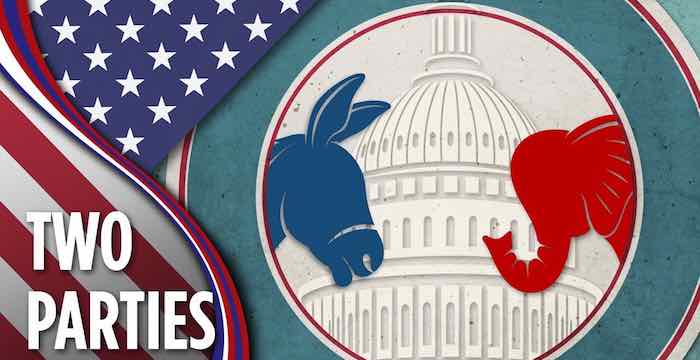By Lee Cary ——Bio and Archives--July 30, 2017
American Politics, News | CFP Comments | Reader Friendly | Subscribe | Email Us

"The 2012 Presidential election signaled the onset of sundown in America, and not merely because an avowed big-spending statist won the race. Rather, it's because the Republican candidate proved in words and lifelong deeds that there is no conservative party left in America--at least not one that is willing or able to defend sound money, free markets, and fiscal rectitude."1The failure to repeal ObamaCare signaled a victory for the American Progressive Movement (APM). And, it further advances the notion that America's two-party political system has become a UniParty. UniParty is a one-act political play with two characters. Once upon a time, there was Laurel and Hardy, Abbot and Costello, Burns and Allen. Today it's Republicans and Democrats. Unlike the bygone comedy duos, the output of the UniParty is not humor, but more and bigger federal government--long the mother's milk of the APM. Although there is no one, official, starting date for the APM, a case can be made that its ideological birth happened in the early 1800s.
"Between the years 1820 and 1920 nearly nine thousand American students set sail for Europe to enter the lecture halls, seminars, and laboratories of German universities...Soon after 1970 American students of the liberal arts and the social sciences began going to Germany in large numbers. By 1878 they outnumbered those of law and of theology, and in the final three decades of the century they more than doubled the volume of the American student migration to Germany."2
"Young, educated, mostly middle-class Americans became the crucial mediators of German social thought and reform. They included such progressive luminaries and seminal thinkers as the journalists Herbert Croly and Walter Weyl, the sociologists George Herbert Mead and the economist Thorstein Veblen [along with lesser-known reformers like]...economists Richard T. Ely (1854-1943), Simon N. Patten (1852-1922), Henry Carter Adams (1851-1921), and Leo S. Rowe (1871-1946)...The progressives believed that learning the lessons of German developments would enable the United States to continue on the path of social progress...Despite their misgivings about the paternalism of the German state, many progressives equated Germany with an ideal of democracy, national unity, and social welfare they themselves wanted to achieve in the United States, In the words of Frederic Howe, Germany was ‘a democratically-minded country...organized on the ideals of Frederick the Great, but guided by the scientific idea of the twentieth century.' A closer look at this misreading of German politics reveals that the positive assessment of German politics had less to do with Germany that with the reformers' attempt to legitimize an American reform agenda and to base democracy on principles other than possessive individualism, utilitarian ethics, and market ideology that liberalism [using the 19th Century definition of the term] held in stock."3The American students who studied in late 19th Century Germany witnessed the influence of Otto von Bismarck and State Socialism in Germany described, by a late 19th Century author, this way:
Support Canada Free Press

"From first to last it is a protest against Individualism, against Laissez-faire. Prince Bismarck has dispersed to the four winds of heaven the old doctrine that the State has nothing to do with economics...He holds that the state has far more to do, if it would discharge its duty to society, than act as a sort of military patrol. Preservation of peace without and within is all well enough so far as it goes, but the providence of government does not end there. The State has not only to see that its subjects live in concord, but to take care that, so far as may be possible, their social conditions are such as promote contentment and happiness. Thus beyond and above the duty of securing citizens in the possession of their rights is the duty of determining what rights may properly be secured to the individual."4Obviously, Natural Rights was not a concept indigenous to Bismarck's Germany. Lest we think Otto von Bismarck has had no lasting influence in America, we need only note his photograph and biography on the Social Security Administration's website where he is heralded as the founder of the "old-age social insurance program." Today, the late 19th Century background for the APM is forgotten by most, but the words of the widely-recognized, philosophical godfather of State Socialism--Georg Wilhelm Friedrich Hegel (1770-1831)--remind us of the dogma that still justifies the state as the mitigator of societal economic inequality.
"Government has the foremost task of acting against this inequality and the general destruction consequent upon it. This can be done directly through making it difficult to achieve high profits; and when [the government] abandons a part of this class to mechanical labour and factory work and leaves it in the rough state, it must however preserve this whole class in some kind of viable condition." 5A UniParty approach toward government-controlled healthcare, coupled with the John Robert's Court labeling of a fine as a tax, leaves only today's Executive Branch of the federal government able to reign in complete federal control of the American healthcare industry as the single payer.
View Comments